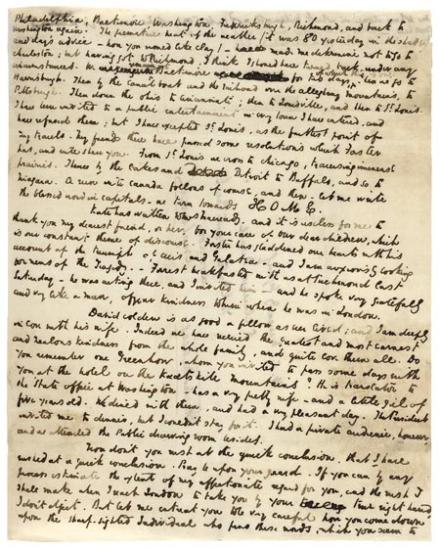
Autograph letter signed, Baltimore, 22 March 1842, to William Charles Macready
Acquired by Pierpont Morgan before 1913
The same day Dickens wrote to Angela Burdett-Coutts, he penned a more reflective, candid letter to Macready, expressing his overall impressions of the United States: "The people are affectionate, generous, open-hearted, hospitable, enthusiastic, good humoured, polite to women, frank and cordial to all strangers; anxious to oblige; far less prejudiced than they have been described to be; frequently polished and refined, very seldom rude or disagreeable." Nevertheless, Dickens concluded: "I am disappointed. This is not the Republic I came to see. This is not the Republic of my imagination. In every respect but that of National Education, the Country disappoints me. ... And England, even England, bad and faulty as the old land is, and miserable as millions of her people are, rises in the comparison."
America
Dickens visited the United States twice, first traveling extensively with his wife from 22 January to 7 June 1842. Twenty-five years later—from 19 November 1867 to 22 April 1868—he returned alone for an exhausting reading tour.
Prior to his first visit, he had "dreamed by day and night, for years, of setting foot upon this shore, and breathing this pure air." He received an unprecedented enthusiastic and extravagant welcome, as befitted the world's first literary superstar. But he soon grew tired of the intrusion resulting from his lionization. After making several vehement speeches in favor of an international copyright agreement that would protect his work from piracy in the United States, he was deeply hurt by the vitriolic response of the American press. His bitter disappointment is recorded in American Notes for General Circulation and his novel Martin Chuzzlewit (1843–44).
When Dickens returned in 1867, his fame, and the adulation it inspired, had intensified. In seventy-six public readings, he performed for more than one hundred thousand people and earned $95,000, equivalent to approximately $1.5 million in today's money.
Philadelphia, Baltimore, Washington, Fredericksburgh, Richmond, and back to Washington again. The premature heat of the weather (it was 80 yesterday in the shade) and Clay's advice—how you would like Clay!—made me determine not to go to Charleston; but having got to Richmond, I think I should have turned back, under any circumstances. We remain at Baltimore for two days, of which this is one. Then we go to Harrisburgh. Then by the Canal boat and the Railroad over the Alleghany Mountains, to Pittsburgh. Then down the Ohio to Cincinnati; then to Louisville, and then to St. Louis. I have been invited to a public entertainment in every town I have entered, and have refused them; but I have excepted St. Louis, as the farthest point of my travels. My friends there have passed some resolutions which Forster has, and will shew you. From St. Louis we cross to Chicago, traversing immense prairies. Thence by the lakes and Detroit to Buffalo, and so to Niagara. A run into Canada follows of course, and then—let me write the blessed word in capitals—we turn towards HOME.
Kate has written to Mrs. Macready, and it is useless for me to thank you my dearest friend, or her, for your care of our dear children, which is our constant theme of discourse. Forster has gladdened our hearts with his account of the triumph of Acis and Galatea, —and I am anxiously looking for news of the Tragedy.—Forrest breakfasted with us at Richmond last Saturday—he was acting there, and I invited him—and he spoke very gratefully and very like a man, of your kindness to him when he was in London.
David Colden is as good a fellow as ever lived; and I am deeply in love with his wife. Indeed we have received the greatest and most earnest and zealous kindness from the whole family, and quite love them all. Do you remember one Greenhow, whom you invited to pass some days with you at the hotel on the Kaatskill Mountains? He is translator to the State Office at Washington— has a very pretty wife—and a little girl of five years old. We dined with them, and had a very pleasant day. The President invited me to dinner, but I couldn't stay for it. I had a private audience, however, and we attended the Public drawing room besides.
Now don't you rush at the quick conclusion, that I have rushed at a quick conclusion. Pray be upon your guard. If you can by any process estimate the extent of my affectionate regard for you, and the rush I shall make when I reach London to take you by your true right hand, I don't object. But let me entreat you to be very careful how you come down upon the sharp-sighted Individual who pens these words, which you seem to
